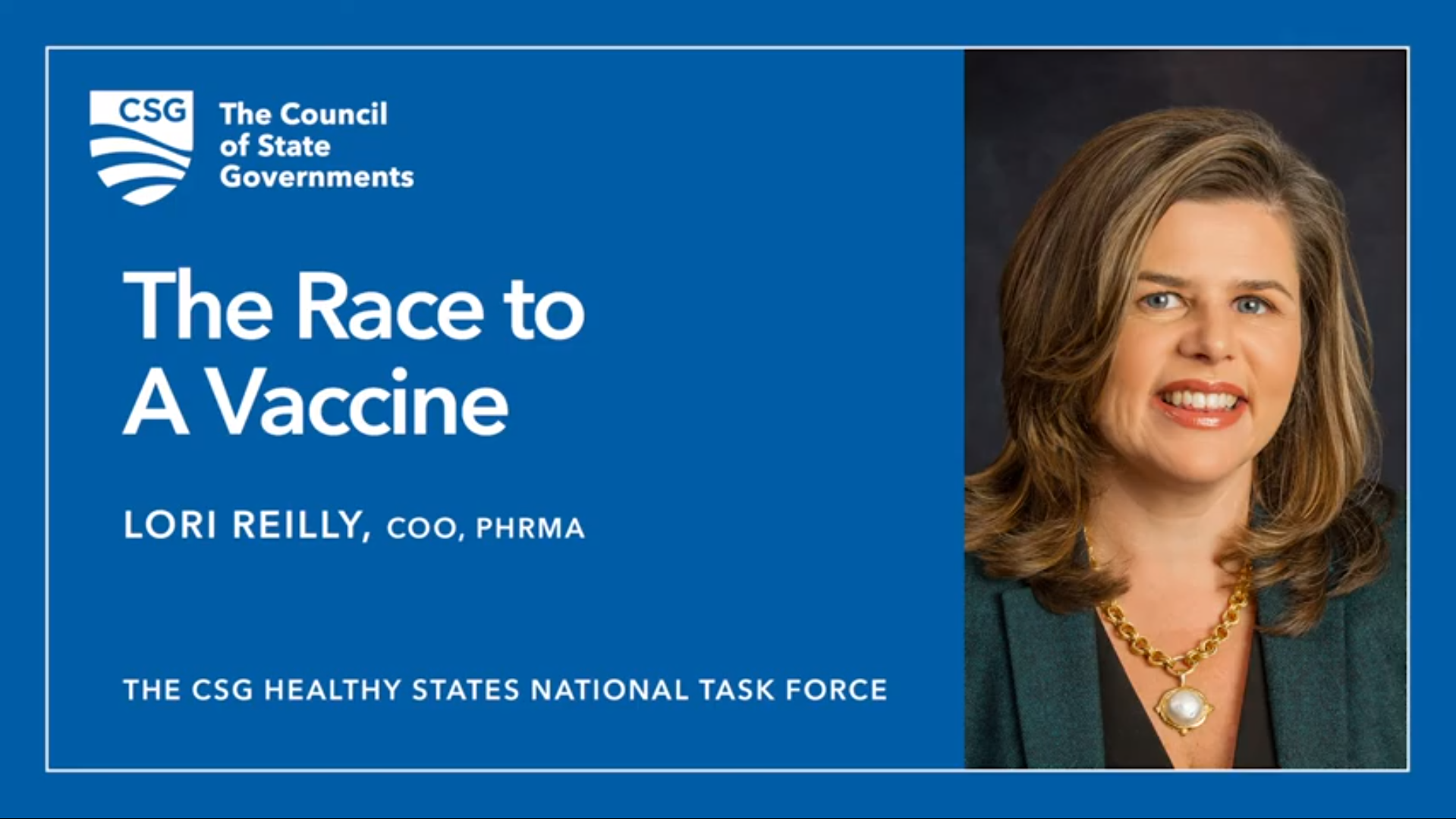Recently, Lori Reilly, Chief Operating Officer at PhRMA, participated in a podcast with the Council of State Governments (CSG) to discuss the important work the biopharmaceutical industry is doing to combat COVID-19.
During this time, state governments have been on the frontlines and providing leadership to make sure their residents remain safe and healthy, while the biopharmaceutical industry continues to work around the clock for treatments and vaccines. We both have unique roles in this fight, but we share the common goal of defeating COVID-19.
Here are 6 key takeaways from the podcast on the industry’s efforts and how it impacts states across the country:
- The biopharmaceutical industry is making progress on vaccines and treatments for COVID-19.
“Right now, I think there's about 120 unique vaccines that are currently in some stage of development. Ten are already in testing in actual people, which is fantastic. It's literally just months after we were able to sequence the virus and understand more about it, so we are you know taking this issue extremely seriously. I think the level of collaboration and engagement in our industry has never been greater.”
- The biopharmaceutical industry is best positioned to take on the challenge of expeditiously finding a cure.
“You know I think it's important to note that the industry wasn't, you know, caught flatfooted here. In fact, we're uniquely positioned for a couple of reasons. The first is just the kind of deep scientific knowledge that has been accumulated over literally decades of experiences.
“The second reason is really also just the literal billions of dollars in technologies that the industry has developed and used overtime that has really shrunk the amount of time it takes now to decode a virus once we know it exists and then develop a vaccine.
“The other area is just our ability to manufacture and broadly disseminate vaccines and treatments. Right now, you know companies are looking at how they can partner with others to ensure that if there's another vaccine that is successful that they're going to be able to manufacture it and make it available. We know that the demand is going to be very high when we get some of these, hopefully, new treatments approved, and so companies today are ramping up production capacity well before they even know whether their medicine is going to get approved.”
- The biopharmaceutical industry was not caught flatfooted. While clinical trials still take time, the industry is moving quicker than ever, all while not compromising safety.
“I think most estimates that we had seen was that it would take a minimum of 18 to 24 months for a potential FDA approval of a COVID vaccine. That was kind of the early news I would say we heard from government and others, but I think it's important to put those numbers into some context. I think what we've heard as of recent is that that timeline is moving further along. It's also a lot less time even if it were to take 18 to 24 months significantly less time than it had has taken previously, and part of the reason that has been the case is that companies are doing many steps concurrently that oftentimes would happen consecutively. Certainly not compromising safety that is of paramount concern to our industry, we can’t jeopardize safety.”
- The collaboration with the public sector to find a common goal has been unprecedented.
“We’ve been sharing what we’ve learned from clinical trials in real time with governments and other companies, so that no one is wasting effort. If we find out something isn’t working, then we’re sharing that knowledge because the goal here is to get something into the market that works.”
- When a vaccine and treatment does become available, the industry will make sure that it is accessible and affordable.
“We are working to make sure that when treatments and vaccines are approved, they will be available and affordable for patients. I would say if you look back at the track record of other kind of pandemic situations, companies have price of products responsible. We don't expect that affordability will be a problem this time.”
- The biopharmaceutical industry is working with state legislatures to provide policies that will reduce the amount patients pay at the pharmacy without compromising innovation.
“We are working with legislatures across the country to support some proactive policies that get at some of the underlying affordability challenges that that we know so many patients face. To ensure that, you know, as patients go to the pharmacy counter to pick up their medicine, what can we do to reduce the prices of the pharmacy in a way that that balances our ability to continue to innovate.”
To listen to full podcast, click here.



